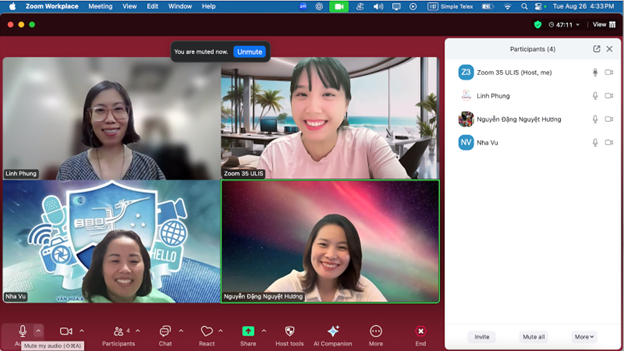Seminar on Designing Task-based Interactions with AI Chatbots for Language Development
- Eduling International

- Aug 26
- 3 min read
Seminar “Designing Task-Based Interactions with AI Chatbots for Language Development” successfully held, attracting a large number of lecturers and students

Translated and adapted from the original post by Dr. Nguyễn Linh, Faculty of English Language and Culture: https://felc.ulis.vnu.edu.vn/seminar-designing-task-based-interactions-with-ai-chatbots-for-language-development-dien-ra-thanh-cong-thu-hut-dong-dao-giang-vien-va-hoc-vien/

On the afternoon of August 26, 2025, the academic seminar titled “Designing Task-Based Interactions with AI Chatbots for Language Development” took place online via Zoom and received significant attention from the ULIS (University of Languages and International Studies, Vietnam National University Hanoi) community. At its peak, the session recorded more than 150 participants, including lecturers, graduate students, and doctoral candidates from various departments across the university.
Opening the event, Dr. Vũ Thị Thanh Nhã – Dean of the Faculty of English Language and Culture – delivered welcoming remarks, emphasizing the importance of staying up to date with trends in applying AI technology to language teaching and learning, as well as the faculty’s commitment to connecting with reputable speakers to enhance the quality of academic activities.

Following that, Dr. Nguyễn Thị Thùy Linh introduced the seminar agenda, outlining the presentations and discussions, and stating the goal of helping participants understand how to design, implement, and evaluate AI-integrated language learning activities using a task-based learning (TBLT) approach.
In the main presentation, Dr. Linh Phung – educator, researcher, and founder of the Eduling Speak app – introduced an AI chatbot model that supports task-based interactions aimed at developing learners’ communicative competence. Her talk clearly explained the foundations of Task-Based Language Teaching (TBLT), suggested ways to design tasks and sequence them based on task complexity, and described mechanisms for chatbots to provide corrective feedback and negotiate meaning similar to the practices of skilled teachers.
Core principles (Ellis, 2003; González-Lloret & Ortega, 2014; Robinson & Gilabert, 2007) were illustrated with sample AI–learner dialogues, helping participants visualize classroom applications and future research directions.
The Q&A session was lively, with numerous questions focused on balancing form-focused instruction with the communicative nature of tasks, criteria for evaluating the effectiveness of AI-human tasks, and suggestions for integrating digital resources to enhance learner engagement. The speaker also shared additional experiences developing Eduling Speak and vision for supporting teachers in scaling their impact by helping them to adopt, adapt, and creating tasks and courses on the Eduling platform through language learning technologies that the platform integrates. She also shares teacher development courses, including Developing Communicative Tasks, on the Eduling Speak app.

Concluding the program, the organizers expressed gratitude to Dr. Vũ Thị Thanh Nhã, Dr. Linh Phung, and all participants. The seminar not only provided updated knowledge on AI in foreign language teaching and learning but also connected the faculty’s community of practice and research, paving the way for future academic collaborations.
Key reflections from participants
In the exit survey, participants shared what they learned and what inspired them most. Several key themes stood out, reflecting increased enthusiasm about integrating technology into language education in meaningful ways.
One major takeaway was the application TBLT and AI. Many teachers commented on how chatbots and AI tools can support communicative and authentic tasks, helping learners practice language in real contexts. This shows a shift from seeing AI as a tool for simple role plays to viewing it as a means for a wider variety of tasks to facilitate richer interaction and negotiation of meaning.
Another recurring insight was the value of frameworks for task design, especially Robinson’s Triadic Componential Framework. Exposure to models like Robinson’s gives teachers practical ways to design tasks with appropriate sequencing and complexity, supporting more intentional and effective lesson planning.
Participants also appreciated examples of engaging activities that make learning fun and motivating, such as emoji games and guessing games. These ideas demonstrate how AI-mediated tasks can be designed to capture learners’ attention and boost engagement.
At the same time, there was an increased awareness of AI's limitations. Many emphasized the importance of using AI critically and strategically, echoing the need to "dùng nó một cách khôn ngoan" or “use it wisely.” Teachers remain central in guiding, contextualizing, and supporting student learning.
Finally, the seminar sparked new research ideas and inspiration. Several participants noted that they left with fresh directions for exploring technology-mediated TBLT and ways to investigate its impact on language teaching and learning.




Learners usually struggle with the complex characteristics of finance topics, especially when it involves concepts like capital spending, risk management, and modeling finances. Many individuals wonder, "Can pay someone to do my finance assignment truly render difficult ideas simpler for students to comprehend?" in these circumstances. The answer is yes. Expert assistance not only provides clear guidance but also equips students with the necessary skills to properly address financial concerns.